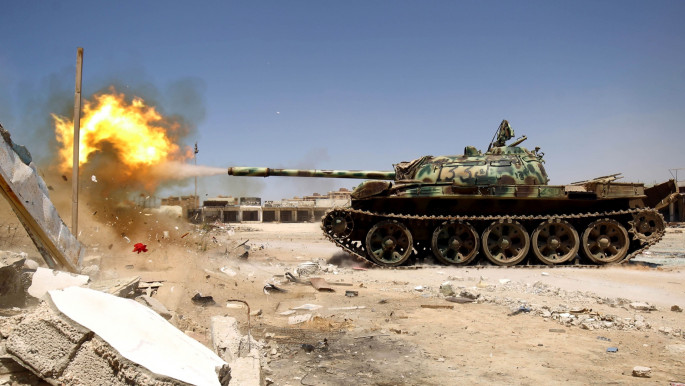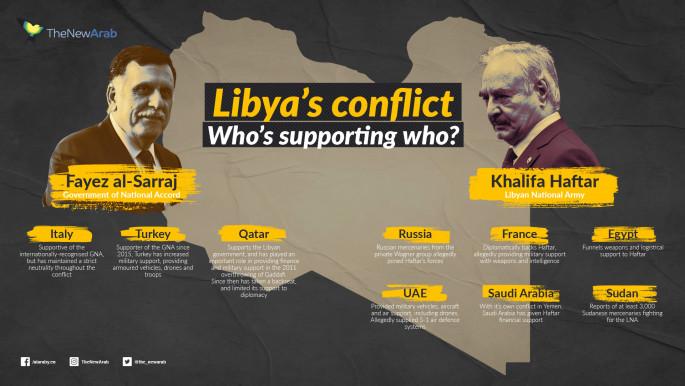Is Libya on the road to de facto partition?
This leads to one question – will Libya inevitably become a de facto partitioned country?
In recent weeks, despite the global Covid-19 pandemic, fighting in Libya hasn't shown any signs of abating. It might, in fact, even be worsening.
On 27 April, General Khalifa Haftar, the leader of the self-styled eastern-based Libyan National Army (LNA), announced that he was accepting what he called a "popular mandate" for his LNA to rule over Libya.
The move seemed to indicate that he is dismissing the very civilian parliament in eastern Libya from which he had hitherto claimed his legitimacy.
Haftar did not give any specifics about how he got this mandate, leading to allegations that he is seeking to establish a military dictatorship over all of Libya.
Since April 2019, Haftar's LNA has attempted to capture Tripoli from his rival, the Government of National Accord (GNA) led by Fayez al-Sarraj, which is recognised by the United Nations as Libya's legitimate government. Neither side has achieved any decisive strategic victories to date.
 |
There is no end in sight for Libya's civil war, since neither of the two warring factions can defeat the other, nor negotiate a peace settlement in good faith |  |
Haftar launched what he called "the decisive battle and the advancement towards the heart of the capital to set it free" to capture Tripoli in December. He's failed to achieve this goal.
Then, in March, the GNA launched Operation Peace Spring, a counteroffensive against the LNA in the west of the country, with the support of the Turkish military.
Foreign backers of Libya's warring factions have enabled them to fight on, but haven't enabled either of them to break the ongoing stalemate.
Haftar, who started this year-long-war with his offensive on Tripoli, receives degrees of military and diplomatic backing from the United Arab Emirates, Russia, Egypt, and France. The GNA, on the other hand, relies on Turkey for its military support.
 |
|
| Read more: Foreign mercenaries and fractured healthcare heighten Libya's coronavirus risks |
Ankara is locked in a region-wide cold war with Abu Dhabi and Cairo and isn't willing to see its Tripoli-based ally deposed by a close ally of these rival states. While Turkey has primarily helped the GNA hold its defensive position in Tripoli, it is increasingly enabling its ally to go on the offensive against the LNA.
Ankara has committed significant resources - from armed drones to armoured vehicles - into this fight, and increasingly large numbers of Syrian militiamen. According to the Syrian Observatory for Human Rights war monitor, Turkey has recruited up to 10,000 Syrian fighters to fight in Tripoli alongside the GNA forces in recent months.
The Turkish military has also shown a more direct and visible presence. Turkey deployed navy ships off the Libyan coast and, on 1 April, a Turkish frigate even fired surface-to-air missiles at LNA drones.
Also in April, Turkish Air Force F-16 jet fighter-bombers and accompanying tanker aircraft flew alongside the Libyan coast in a clear show of strength, demonstrating both Turkey's reach and its determination to prevent Haftar from prevailing in this conflict.
The LNA began using its economic leverage over Tripoli early this year by blockading Libya's oil exports, the main source of revenue for that North African country. The GNA expressed fears that oil exports could fall from 1.2 million barrels per day to a paltry 72,000 barrels as a result of this and cause a crippling financial crisis.
Since launching Operation Peace Storm, the GNA has sought to push the LNA out of artillery range of Tripoli.
 |
Foreign backers of Libya's warring factions have enabled them to fight on, but haven't enabled either of them to break the ongoing stalemate |  |
In recent weeks, the GNA has also made advances against the LNA along the Libyan coast. One strategically important town it wants to capture is Tarhuna, which is presently the LNA's main support base for its siege against Tripoli.
Tarhuna is situated roughly 65 km southeast of the Libyan capital. If the GNA are able to completely seize it from the LNA, then Haftar's ability to attack and threaten Tripoli will become severely circumscribed over a year after he vowed to capture that entire city.
Read more: How has coronavirus impacted conflicts in the Middle East?
However, even if the GNA does achieve that important victory over its adversary, which it likely will, that doesn't mean it will have the momentum – even with Turkey stepping up its military support – to push on and capture the LNA strongholds of Benghazi and Tobruk and unite the country under its control.
Moreover, both sides have demonstrated that they are unwilling or incapable of making the compromises necessary to implement a successful and lasting ceasefire, much less negotiate a comprehensive political settlement to bring the conflict to an end. The failed Berlin Conference in January aptly demonstrated this reality.
 |
|
| Click to enlarge |
Aside from agreeing to occasional short-term truces, the LNA invariably refused to enter ceasefire negotiations in good faith when it had the upper hand in the earlier stages of the Tripoli siege. Instead, it bided its time, clearly hoping to capture Tripoli, establish facts on the ground and impose a military solution to the conflict in its overall favour.
Now that the GNA is finally beginning to push back the LNA and win some battlefield victories it too is refusing to adhere to any ceasefire. It has rejected Haftar's latest call for a ceasefire for Ramadan.
Ironically, last Ramadan it was Haftar encouraging his forces to fight even harder to capture Tripoli during the Muslim holy month.
With this state of affairs, the Libya conflict will likely drag on despite the fact neither side can completely overrun or defeat the other.
This, in a sense, brings us full circle and back to the question of a de-facto partition, which would consist of a GNA polity in the west with its capital in Tripoli and an LNA polity in the east situated around Benghazi.
It's worth remembering that a historical divide long existed in this region between the provinces of Tripolitania in the west and Cyrenaica in the east before the foundation of the modern unitary Libyan nation state.
Read more: Libya is catastrophically ill-equipped to battle a coronavirus outbreak. Here's why
Today, Tripoli and western Libya is a battlefield while Benghazi and eastern Libya remains relatively stable.
At the start of the 2011 Libyan uprising against dictator Muammar Gaddafi, on the other hand, Benghazi was the battlefield and the focal point of the armed rebellion. In stark contrast, Tripoli remained relatively calm and stable until the ragtag rebels from the east, with support from intervening NATO militaries, were able to capture it.
As the protracted and stalemated GNA-LNA war drags on into the foreseeable future, it perhaps wouldn't be all that surprising if Libya eventually settles into a de-facto partition that will make a certain amount of historical sense.
Follow him on Twitter: @pauliddon




 Follow the Middle East's top stories in English at The New Arab on Google News
Follow the Middle East's top stories in English at The New Arab on Google News


